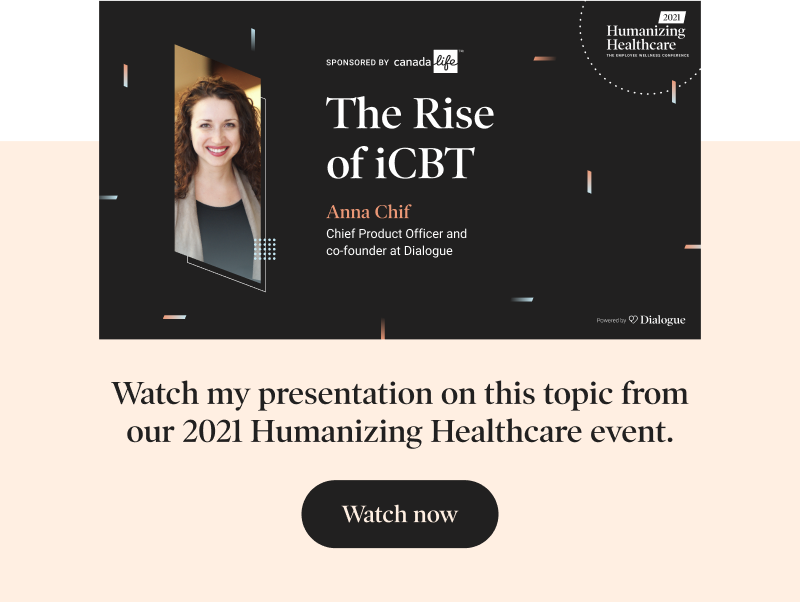The current pandemic has been a major disruption to businesses globally and has presented significant physical health challenges. But it has also resulted in another, less obvious pandemic, as individuals face a dramatic increase in mental health issues. The numbers don’t lie: mental health claims in 2021 alone rose by 24%, also making them the culprit behind the biggest proportion of long-term disability claims across all industries and company sizes in Canada[1,2]. The last 18 months have proven that mental health services won’t remain a negotiable benefit much longer, with 76% of companies looking to make it a top priority in 2022[3].
Why traditional benefits programs fall short
Face-to-face therapy isn’t for everyone and traditional mental health services don’t always adequately help all those who need them. In fact, almost 50% of Canadians claim to have partially met or entirely unmet mental health needs[4]. What’s more is that 23% of these Canadians with unmet needs would actually prefer to manage their mental health on their own, in their own time.
Challenges we tend to come across are as follows:
-
While the number of people with mental health concerns continues to grow, there still exists a stigma around therapy which hinders some from seeking help when they need it most.
-
Alternatively, those who do want to speak with a therapist often experience long wait times and no continuity of care from traditional employee assistance programs (EAPs).
-
Finally, multiple wellness programs across different platforms can result in a confusing experience for members about where to go when they need help, resulting in an overall lower program adoption rate and a longer time to reach a positive outcome.
Why is iCBT key to a mental health program?
While existing programs are intended to support a good portion of members, our goal was to support all members, regardless of their specific issue or care preference. Earlier this year, we introduced an internet-based cognitive behavioural therapy (iCBT) program to our portfolio of mental health services. By doing so, we have significantly increased the support level for all members while remaining cost-effective to organizations.
Specifically, iCBT is the missing piece for two key factors:
-
Autonomy and privacy
Nearly one in four Canadians prefers a fully autonomous support experience. An iCBT program provides members with 100% confidential access to clinically-proven self-care toolkits.
-
Longer continuity of care
An iCBT program is accessible 24/7, allowing members to choose their own self-care journey anytime, anywhere. Additionally, they can continue leveraging the program once they’ve reached their limit on face-to-face therapy programs or while waiting to be assigned to a therapist.
Moreover, seamless integration with practitioner-led programs reduces the confusion about where to go for help when the time comes, ensuring full member coverage at every stage of their mental health journey.
What does iCBT include and what should you look for to maximize efficacy?
iCBT is online cognitive behavioural therapy offering self-led exercises that challenge unhelpful thought patterns and teach users to think differently, leaving room to modify their feelings and behaviours, too.
I can attest to its efficacy. I have definitely not been immune to the effects of the pandemic! There was a period during the summer where it just felt like everything was falling apart. I was at home feeling frustrated with myself for not being fully present. I was in meetings, thinking about my kids and having this awful feeling of lack of control. This is when I decided to opt for iCBT. Still today, instead of picking up a book in the evening, I turn my attention towards Dialogue’s iCBT program and do a few of the exercises. It really allows me to think through my day before I put away my phone for the night. I was able to evaluate and rewrite the stories I was telling myself and support myself as I went through this more difficult time.
To support those who don’t want to see a therapist, who struggle to attend appointments, or those who prefer improving their mental health on their own, an iCBT program is a cost-effective solution that supports all of your members, and should revolve around these five key aspects to drive positive outcomes more quickly.
-
Available anytime, anywhere via mobile app or web browser
To encourage employees to help themselves to the self-paced, interactive toolkits and psychoeducation of an iCBT program, it should be as accessible as possible, with no barriers to start. This means no wait time to speak to a mental health professional and no eligibility requirements to access the program.
-
Independent and coach-supported models available
iCBT should give users the power to be fully autonomous in their mental health journey, but also have an option to seek assistance from a coach who can help them stay on track or act as an accountability partner for the user on their journey to improving their mental health.
-
Seamless integration with practitioner-led therapy
To deliver a longer continuity of care and reduce the amount of gaps in a member’s mental health journey, the transition from self-led therapy to practitioner-led therapy (including foundational mental health programs like an EAP) should be seamless. The opposite should also be true: an EAP therapist should be able to recommend iCBT as an option if a member needs continued support, which would ideally be available from the same access channel or platform (like single sign-on).
-
Support for top mental health issues
Self-led materials should help deal with the most requested mental health issues including general anxiety, depression, divorce, social anxiety, and bereavement. -
100% free to employees
It's crucial that it remains 100% free to employees with no out-of-pocket fees. You don't want employees to interrupt their progress by having to make a payment, even if it may be reimbursed afterwards. A price-per-employee-per-month (PEPM) model allows employers to fulfill that criteria at no extra cost to the employees, without any barriers or friction to seek help.

Who can benefit from Dialogue’s iCBT?
Through our acquisition of ehub Health in 2021, Dialogue has been able to offer a robust iCBT program. Curated by mental health experts with over 20 years of experience, the program has served hundreds of thousands of users globally and its efficacy has been proven against the highest standard of effectiveness, including several peer-reviewed randomized controlled trials (RCT) and studies published in leading medical and science publications.
Dialogue’s iCBT program can be found directly on our Integrated Health Platform™, centralized with other mental health services members have access to (including our EAP). Within a few minutes, users complete a quick GAD-7/PHQ-9 questionnaire to determine their mental health score, and can then access our clinically proven iCBT library for cognitive behavioural therapy, relaxation, exercise, and more to help manage a myriad of different difficult situations. I am so proud of this product; it's been a huge addition to Dialogue and the way we think about virtual healthcare.
Learn more about Dialogue’s mental health services on our website: https://www.dialogue.co/en/mental-health.
Resources
-
Canadian Life and Health Insurance Association’s annual fact book, as sourced by Benefits Canada: https://www.clhia.ca/web/CLHIA_LP4W_LND_Webstation.nsf/resources/Factbook_2/$file/2021+FACT+BOOK+EN.pdf.
-
2019 Sun Life report: Designed for Health: https://www.sunlife.ca/static/slf/Designed%20For%20Health/Designed%20for%20Health%20GB00284%20E.pdf.
-
Survey by Business Group on Health, as sourced by Benefits Canada.
-
Statistics Canada. 2018. Mental health care needs, 2018.




 Canada (EN)
Canada (EN)
 Global (EN)
Global (EN)








